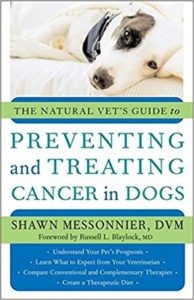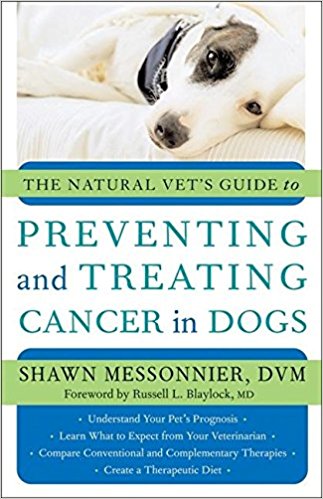By Shawn Messonnier, DVM
An ounce of prevention is worth a pound of cure. How true this is for cancer. After reading this book, I realized how much our diet could influence cancer. I just thought some people and dogs were unlucky enough to get cancer.
Today, many cancers are preventable. With dogs, we control their food, exercise, and chemical exposure—so we can potentially reduce their cancer risk. Approximately 50% of senior dogs will develop cancer. 
So much about cancer in dogs also applies to people that reading this book about dogs may help you understand cancer and make changes for yourself. Although published in 2006, much of this information is very useful and is now more widely accepted by veterinarians.
The Natural Vet’s Guide to Preventing and Treating Cancer in Dogs has information similar to the Dog Cancer Survival Guide, but includes more technical information, even discussing dosages and studies. I liked that Dr. Messonnier discussed many aspects of treating cancer, even if there is no clear evidence that they work.
Preventing Cancer
- Vaccinating as needed instead of just as a routine.
- Feed a healthy diet free of by-products and chemicals. A homemade diet is best
- Supplement their diet with nutraceuticals, which support the immune system.
- Keep your pet at an ideal weight.
- Have your vet do a fine needle aspirate on all lumps. Early detection of cancer improves survival rates.
- Use natural insecticides when possible to control fleas, ticks, and other parasites.
- Have your pet spayed/neutered between four and six months of age.
- Prevent other diseases such as heartworm.
- Don’t expose your dog to tobacco smoke or other toxins such as lawn chemicals.
- Treat long-term inflammation and oxidation. These are the main causes of many cancers.
- Visit your veterinarian regularly. Do not self-treat your dog. Only treat under the guidance of a veterinarian.
The battle against cancer is often determined at the microscopic stage.
A well-functioning immune system can often identify and remove cancer cells.
Types of Cancer, Typical Treatments, and Similar Non-cancerous Forms
Many different forms of cancer and their treatments were discussed. These include:
- Skin tumors, both cancerous and benign
- Mast cell tumors
- Soft tissue tumors (sarcomas)
- Breast tumors (mammary adenomas & adenocarcinomas)
- Bone cancer (osteosarcoma)
- Hemangiosarcoma
- Bladder Cancer
- Oral Cancer
- Lymphoma (lymphosarcoma)
Working with your Veterinarian
Dr. Messonnier provides a list of questions to ask your vet about his proposed treatment plan for your dog. I have been tongue-tied with panic when told my dog has cancer. Having this list of questions helps you determine a plan based on your concerns and not just your vet’s typical procedures.
Veterinarians differ depending on their approach depending on if they use conventional, alternative, or holistic treatments.
- A conventional vet is more likely to use traditional, proven treatments, such as surgery, chemotherapy, and radiation.
- An alternative vet would use treatments such as homeopathy, acupuncture, herbal and nutritional medicines.
- A holistic or integrative vet uses both conventional and alternative methods. The holistic viewpoint in this book may differ with common uses of the term. Nowadays, holistic means using only all natural treatments. Holistic vets treat the whole dog and don’t just focus on the problem, which is typical of conventional veterinary practices.
Many vets, including my own, do not actually list which type of practice they have. However, an alternative or holistic vet is likely to list these types of services on their websites.
Recently, my cocker spaniel, Chipper had an enlarged spleen and my vet had recommended various tests to determine if it was cancer. The number of tests and their cost caused me concern. According to this book, these tests help determine the type of cancer and how far it has spread. Not all of these tests may be required. Typical testing may include:
- Physical exam
- Diagnostic imaging, including x-rays, MRI and CT scans, ultrasound
- Urine evaluation
- Blood tests
- Bone marrow evaluation
- Fine-needle aspirate
- Biopsy
The majority of The Natural Vet’s Guide to Preventing and Treating Cancer in Dogs discusses both conventional and complementary therapeutic treatments in detail. Some of these complementary therapies included acupuncture, chiropractic, herbs, homeopathic, and nutritional supplements.
Dietary considerations for dogs with cancer included feeding more protein and fewer carbohydrates. Amino acid supplements and omega-3 fatty acids were included along with the use of fresh vegetables. A homemade recipe was included.
I rate this book with 4.5 out of 5 stars, only because it is technical. However, the typical audience for this book would include veterinarians.
This post represents my own opinion and was not sponsored in any form.
Do you have or have had a dog with cancer? What kind of treatments are you using? Please comment below.


A great post! My dog has some issues with her immune system and my vet has her on a limited vaccine regime. I’m glad to know that this is also beneficial in protecting her from cancer.
I know lots of people would love to feed their dogs additive free food. I hope as time goes by it will become less expensive, or raw feeding more practical for those on a budget. Education on good and healthy budget food is something I think pet food bloggers can lead the field in so people do not give up so easily.
It is encouraging though to know we can push forward on a lot of different fronts to prevent cancer. It certainly does give me hope.
I agree 1,000,000% on natural flea and tick remedies. Our colleague Tiny Timmy developed his ‘Dirty Flea Soap’ with a total focus on pet safety. People often forget some natural oils and herbs are toxic to cats and dogs so again, education is a cheerleader for the health and safety of our wonderful pets.
Thank you for your comments. I’ll have to look into Dirty Flea Soap.
Great post and I so agree! I definitely think that like our human food, pet food has been tampered with to cause more illnesses (cancers) in our pets. It’s shocking some of the things that make up conventional pet food. But education is key and I remember when my cat Dusty was sick I was fortunate to have good vets accepting of my wish to try natural holistic alternatives in conjunction with conventional treatments. Looking back I know in my heart that Dusty’s last few months were of quality because of it. Will definitely share this post to help inform others.
Thank you for your comments. Many pet foods are not nutritional and may even help cause cancer. Finding a good vet that supports your decision on treatments if very important.
I love this and totally agree! Sure animals have DNA just like people and yes they can be more prone to cancer and other ailments but we also should be preventative and do all we can to ensure we give them the best possible life. There is so much we can do to stave away this deadly disease in our pets! I have had a pet die of cancer so it happens, even if we do all we can. We can’t always help it but at least we can feel good in knowing it was not our fault when it does happen when we do our best.
This is such an important topic. My friend’s dog had cancer and the dog had a lot of tissue removed to get rid of it. Thankfully, the doggie is not in pain or at least doesn’t show it. The first vet said it was nothing. When they went for the second consultation with another vet, it was already an emergency.
I have found that a second opinion does help.
Since owning Dolly I’m learning so much about how cancer is so common in dogs, just like people. I’ve learned a lot from the PuppyUp Foundation that supports research to study the similarities in cancer for dogs and people. Hopefully soon dogs will do as well with treatment as people.